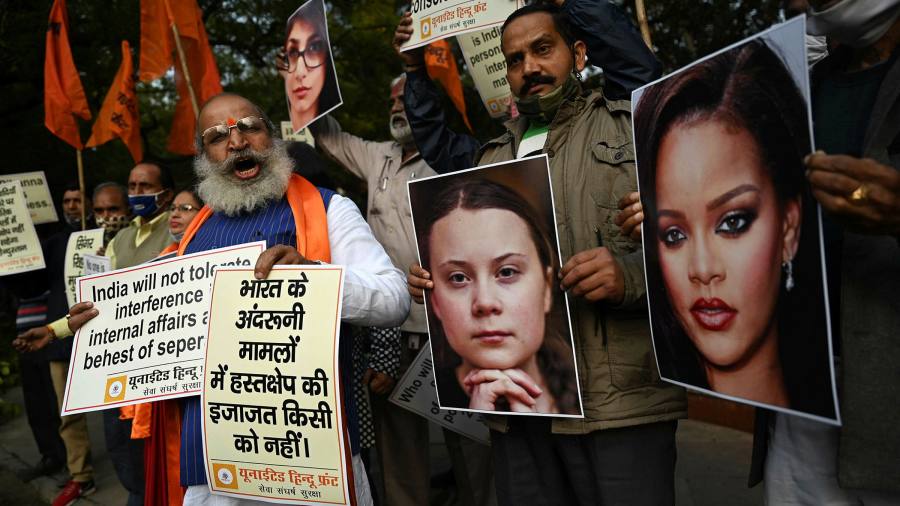[ad_1]
India has announced sweeping rules that could force social media companies to break into encrypted messages and take down posts New Delhi deems contentious.
Government officials said on Thursday that the new guidelines would help end “double standards†by making platforms more accountable to the law.
The rules, which apply to almost everything online, follow a government stand-off with Twitter earlier this month after it refused to block accounts tweeting about widespread farmers’ protests.
“We want them to be more responsible, more accountable,†said IT minister Ravi Shankar Prasad in New Delhi, “if they [won’t], then whatever provisions are there in the law will take their course.â€
Prasad described the rules as “soft touch oversight†and called on companies to “self-regulateâ€.
The new rules require companies to take down offensive content that threatens the “unity, integrity, defence, security or sovereignty of India†or “causes incitement†within 36 hours of an order, according to a copy of the draft legislation seen by the Financial Times.
Companies have to appoint a chief compliance officer, create a law enforcement co-ordination position and another for a grievance redressal officer, all of whom must be Indian residents.
The rule change can also require companies to break into encrypted messages in order to identify the “first originator†of information to assist with the “prevention, detection, investigation, prosecution or punishment of an offenceâ€.
Prasanth Sugathan, legal director at the Software Freedom Law Centre, India, said that the new rules were “problematic†and had major privacy implications.
“Definitely, there can’t be a compromise on security of communications,†said Sugathan. “It’s going to open up a lot of legal challenges.â€
The rules come as New Delhi is trying to reset its relationship with Big Tech. India, with a young population of 1.4bn people who are rapidly coming online, represents one of the most promising growth markets for tech companies beyond the US and China.
But navigating New Delhi’s increasingly authoritarian politics and changing regulations is an obstacle for social media companies, who are trying to expand while maintaining free speech and privacy.
WhatsApp, Twitter, Amazon and Netflix declined to comment on the new rules.
“This amounts to surveillance,†said one person close to a big US tech company operating in India. “It certainly raises questions about privacy, now you literally don’t have a place to have a private conversation.â€
Under the new rules, streaming platforms such as Netflix and digital media, including news organisations, will be subject to greater oversight.
Netflix and Amazon have been under scrutiny in India, with police from states ruled by Modi’s Hindu nationalist Bharatiya Janata party filing criminal cases against executives for “hurting religious sentimentsâ€.
Salman Waris, a partner at technology law firm TechLegis, said the new rules created an “additional burden†on companies which were going to face a number of “compliance issuesâ€.
He said he rules need to be clarified because they did not give details or specifics on implementation. “That could lead to a lot of confusion,†he said, “I think they will have to come out with some clarifications and I’m sure industry is going to ask for that.â€
[ad_2]
Source link






